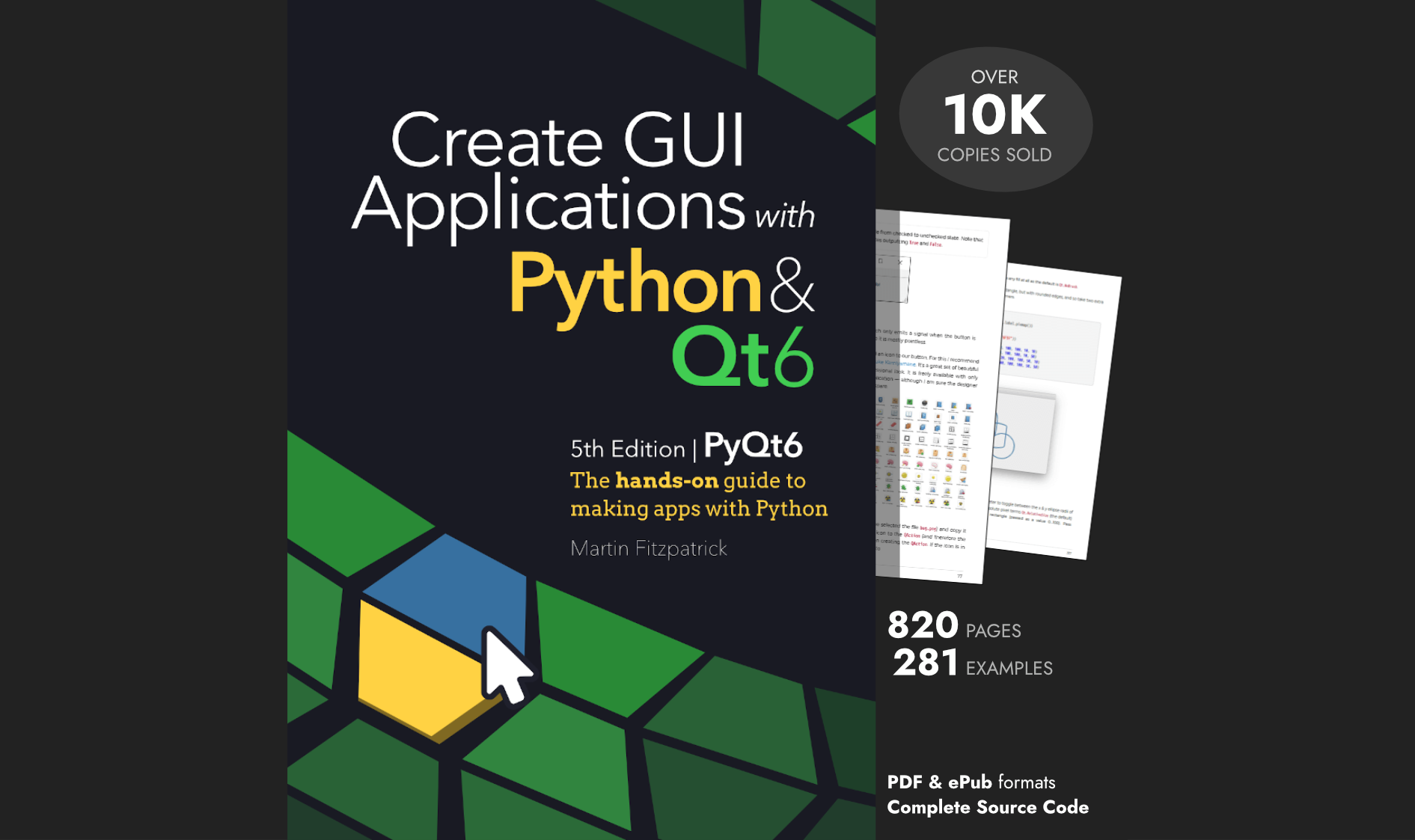JohnThePips | 2021-04-26 20:38:39 UTC | #1
I start with thanks to Martin Fitzpatrick for excellent explanation and code for running QRunnable objects within QThreadPool. My problem is that I have three separate processes where one of those is taking the results of the two as arguments. Of course I could combine them into on big function but as the result are stored in variable accessible for all the processes it is not necessary to run all of three processes every time.
So I start with Martin code that is used as class definition for QRunnable object and signals
class Worker(QtCore.QRunnable):
'''
Worker thread
Inherits from QRunnable to handler worker thread setup, signals and wrap-up.
:param callback: The function callback to run on this worker thread. Supplied args and
kwargs will be passed through to the runner.
:type callback: function
:param args: Arguments to pass to the callback function
:param kwargs: Keywords to pass to the callback function
'''
def __init__(self, fn, *args, **kwargs):
super().__init__()
# Store constructor arguments (re-used for processing)
self.running = None
self.fn = fn
self.args = args
self.kwargs = kwargs
self.signals = WorkerSignals()
# Add the callback to our kwargs
self.kwargs['callback_progress'] = self.signals.progress
self.kwargs['callback_data'] = self.signals.data
# @Slot()
def run(self):
'''
Initialise the runner function with passed args, kwargs.
'''
# Retrieve args/kwargs here; and fire processing using them
try:
self.signals.started.emit()
self.result = self.fn(
*self.args,
**self.kwargs
)
except:
traceback.print_exc()
exctype, value = sys.exc_info()[:2]
self.signals.error.emit((exctype, value, traceback.format_exc()))
else:
self.signals.result.emit(self.result) # Return the result of the processing
finally:
self.signals.finished.emit() # Done
Then I am using a function which executes functions passed to that as arguments
def exe_worker_run(self, WorkerPool, function, arguments):
Worker = thread.Worker(function, arguments)
Worker.signal.started.connect(self.sig_thread_start)
Worker.signal.error.connect(self.sig_thread_error)
Worker.signal.result.connect(self.sig_thread_result)
Worker.signal.finished.connect(self.sig_thread_finish)
WorkerPool.start(Worker)
The results are intercepted by the following function (of course it is simplified)
def sig_thread_result(self, result):
self.dataframe = result
Then the "function" argument in the exe_worker_run is the name of the function that performs the real job. Again the simplified version of that function will look like
def exe_languages_load(self, arguments, callback_progress, callback_data):
try:
result = (sql query to database)
except Exception as ex:
session.rollback()
print(ex)
finally:
session.close()
return result
The problem is that the results of two functions which are then arguments for third are not emitted before the execution of third function is started. What should I do to allow sequential execution of all three functions in a way which will postpone the execution of third until the results of first and second are emitted and assigned to respective dataframes?
Create GUI Applications with Python & Qt6 by Martin Fitzpatrick — (PySide6 Edition) The hands-on guide to making apps with Python — Over 15,000 copies sold!
martin | 2021-04-30 15:43:38 UTC | #2
Hi @JohnThePips welcome to the forum & glad you've found the code examples helpful.
What you're asking is actually quite tricky to accomplish. The trick is to use a finished signal to trigger the execution of the next workers but add some kind of check to that method to make sure that both the prior workers have completed. A good way to do this is to give your workers IDs and emit those, storing the result in a list or dictionary. Checking this dictionary will let you know the current state & whether you can proceed.
from PySide2.QtCore import QObject, Slot, Signal, QRunnable, QThreadPool
from PySide2.QtWidgets import QApplication, QMainWindow, QPushButton
import time
class Signals(QObject):
finished = Signal(str, str) # worker_id and our data is a string
class BaseRunner(QRunnable):
def __init__(self, data):
super().__init__()
self.data = data
@Slot()
def run(self):
print("Running.. ", self.data)
time.sleep(self.delay)
print(".done")
# do something
self.data = self.data + '[more data]'
self.signals.finished.emit(self.worker_id, self.data) # emit the worker ID too
class RunnerA(BaseRunner):
worker_id = 'A'
delay = 5
signals = Signals()
class RunnerB(BaseRunner):
worker_id = 'B'
delay = 10
signals = Signals()
class RunnerC(BaseRunner):
worker_id = 'C'
delay = 3
signals = Signals()
class MainWindow(QMainWindow):
def __init__(self):
super().__init__()
button = QPushButton("Start")
button.pressed.connect(self.start_initial_runners)
self.setCentralWidget(button)
self.data = {}
self.threadpool = QThreadPool()
def start_initial_runners(self, data=None):
self.data = {} # reset
runnerA = RunnerA('first')
runnerB = RunnerB('second')
# When either finishes, they will check to see if the 3rd can start.
runnerA.signals.finished.connect(self.start_third_runner)
runnerB.signals.finished.connect(self.start_third_runner)
self.threadpool.start(runnerA)
self.threadpool.start(runnerB)
def start_third_runner(self, worker_id, data):
print("Finished", worker_id)
self.data[worker_id] = data # store data
if 'A' in self.data and 'B' in self.data: # we have both results:
runnerC = RunnerC('third')
self.threadpool.start(runnerC)
else:
print("Not ready yet. Waiting.")
app = QApplication([])
w = MainWindow()
w.show()
app.exec_()
In the example above the completion of the runners will call start_third_runner. This will happen twice, once for each of the prior runners, but only when both are complete will it proceed. If you run it you should see the following output.
Running.. first
Running.. second
.done
Finished A
Not ready yet. Waiting.
.done
Finished B
Running.. third
.done
The "Not ready yet. Waiting." message is shown when either A or B is complete (we have receved start_third_runner method via a finished signal) but not both.
JohnThePips | 2021-04-30 16:21:35 UTC | #3
Dear Martin, Thanks for the tip. I thought the solution would be much simpler but as there is no other way I would have to pursue that idea. I am however quite surprised that there is no built-in mechanism that allow to control the start of thread when a certain trigger is fired. However as I am not super advanced programmer it might be that there are some other circumstances that prevent such built-in mechanism to be implemented. Anyway once again thank you for the tip. I will certainly test the solution.
martin | 2021-04-30 17:58:39 UTC | #4
You can start a QThread directly using a signal (by calling .start()) but I don't think that will help in your case -- because C depends on A & B being complete, and they (being threads) can complete in any order -- a single trigger from either isn't actually sufficient to start C.
As I understand it, what you're asking for isn't a "built-in mechanism that allow to control the start of thread when a certain trigger is fired" but a "built-in mechanism that allow to control the start of thread when two triggers have been fired".
Waiting for two signals inevitably makes things more complicated as you now need to maintain state to know what you've received. There is also the complication that you need to pass data from A & B to C -- C must wait until it has the output from both A & B.
Purchasing Power Parity
Developers in [[ country ]] get [[ discount.discount_pc ]]% OFF on all books & courses with code [[ discount.coupon_code ]]This all adds up to making it a bit too use-case specific for a built in. If you can remove some of these constraints there might be a way to simplify things, e.g. it's simpler if you just have a A -> B -> C setup. Then you can limit a QThreadPool to 1 max threads (you can have many pools).
PedanticHacker | 2021-05-01 01:46:34 UTC | #5
@martin, would it be possible to define custom signals in a QRunnable subclass like in the example below?
class BaseRunner(QRunnable, QObject):
finished = Signal(str, str)
def __init__(self):
super().__init__()
# And so on...
Multiple inheritance to the rescue? 🤔
PedanticHacker | 2021-05-03 22:29:04 UTC | #6
I tried to define custom signals in a QRunnable subclass by also inheriting from QObject in the same object (multiple inheritance), but my application crashed. I guess you can't do that. It would be interesting to know why this can't work. Seemed like a good idea at first.
martin | 2021-05-05 07:58:43 UTC | #7
I wasn't sure if it would work, so glad you tried it out ;) ...I think the issue is that QRunnable and QObject have different C++ base classes. While it might be valid to implement your custom class using these two classes in C++, PyQt can only hook to existing C++ classes -- for this to work it would need to have a (compiled) implementation of a class using these two bases to hook to.
martin | 2021-05-05 08:00:12 UTC | #8
When I first read this I thought you were using the Signals wrapper class and putting that on the base -- fwiw that also won't work as written, because then each worker will share the same signals object. When you get to running the 3rd runner it will now have 3 signals attached to itself.
Of course, you could exploit that to avoid hooking them up on each run. But in that case I'd move the signals object off the runner class to avoid the confusion.
Create GUI Applications with Python & Qt5 by Martin Fitzpatrick — (PySide2 Edition) The hands-on guide to making apps with Python — Over 15,000 copies sold!

